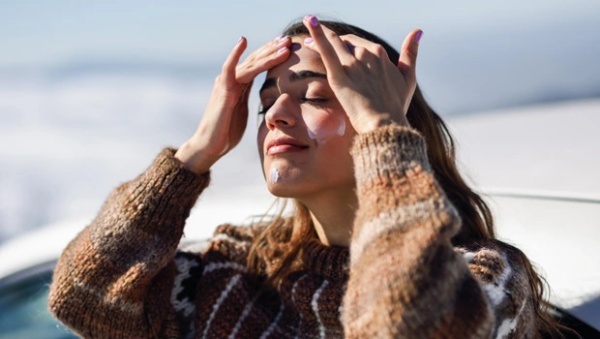
Why does sunscreen make my face oily?
When I put sunscreen on my skin, it feels shiny and gross.
It also causes the skin to feel congested for many people, which leads to breakouts. When using sunscreens, this is frequently a disincentive for many. Now, we all know it’s not a good idea to forget to wear sunscreen as the SPF protects us from the harsh sun rays, so here are the ways how to fix this issue;
Choose a Light Formula
One can opt to buy sunscreens with a light formula. These sunscreens are perfectly formulated for acne-prone skin and sensitive skin tones.
Another piece of advice is to forego using moisturizer. First, this would be an unnecessary second layer of moisture. Don’t worry, and this won’t affect how your makeup applies.
You can also choose moisturizers that contain SPF, which can be perfect because you won’t have to apply two layers of it onto your face. This means less chance for shiny spots and a more hydrated-looking complexion!
Translucent Powder
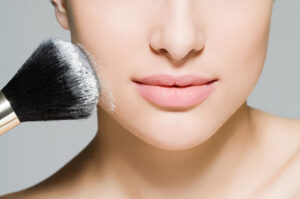
You need a translucent powder, which I am sure must already be there in your beauty kit. As you may know, we use it for baking makeup products and set products like concealer. Did you realize that this product also soaks up any extra unwanted oil on the skin, giving an elegant fresh look?
Use a powder brush to apply translucent powder to the face after liberally applying sunscreen and allowing it to dry for a while. Apply even strokes to your face and neck after gently tapping the brush to eliminate any excess product.
Avoid Chemical Sunscreens
The chemical sunscreens can worsen breakouts by inflaming the skin further. This is because these chemicals are built to react with UV rays and turn into infrared radiation, which then uses heat to disperse it when applied to your face! So if you have sensitive skin, ensure you don’t get chemical sunscreens.
Other Reasons
Most of us connect strongly formulated and thick mineral sunblocks with a heavy and hot feeling after applying sunscreens. However, this is not always the case unless you are wearing a very high SPF, have applied too much, or are using an emollient-containing lotion.
Applying sunscreen at least 20 minutes before stepping outside your home will help avoid a shiny look on your face. The product should be applied in wiping motions instead of rubbing it into the skin, which can cause excess sebum production and make you more prone to breakouts!
How to Choose Sunscreens
Summer is almost here, so it’s time to consider sunscreen. It can be hard to know which one to choose, so today, we’re going to talk about how to pick the right sunscreen for you. Sunscreen is essential year-round, especially in the summer when the sun is more potent. So without further ado, let’s get started!
Of course, we all know wearing sunscreen is a perfect way to protect skin from the sun. Let us get into the different SPF creams you can choose from to feel light while also being protected.
SPF 30 or higher
It would be best if you always used an SPF of 30 or higher to protect your skin from the sun’s harmful rays. The higher the SPF, the better your protection from sunburns, skin damage, and skin cancer.
Broad-Spectrum Protection
If you don’t protect your skin from the sun, it will become more delicate and vulnerable to damage. You should use a sunscreen that protects against UVA rays, which cause wrinkles, and UVB’s harmful heat waves – these can lead to aging and cancer!
Water-Resistant
We recommend wearing water-resistant sunblock, especially if you plan on swimming or sweating. According to AAD, it typically lasts either 40 minutes before needing another application or 80, which is excellent!
For Different Skin Types
For Dry to Normal Skin
To maintain your skin’s moisture, you should pick a sunscreen with hydrating ingredients like hyaluronic acid or glycerin. For those who have dry skins and are looking for extra hydration in their beauty routine, check out these products!
For Combination to Oily Skin
For oily or combination skin, look for sunscreens labeled “oil-free” and non-comedogenic. These will help avoid clogged pores from becoming worse acne breakouts!
For Sensitive Skin
Those with sensitive skin should avoid products that contain fragrance or other additives because they can be harsh and irritating.
Related read: The best sunscreen for face.
Are mineral sunscreens better than chemical sunscreens?
Chemical sunscreens work by absorbing and reflecting the sun’s harmful ultraviolet (UV) rays. In contrast, mineral sunscreens work by creating a physical barrier on your skin that reflects the UV rays.
Mineral sunscreen contains two ingredients: zinc oxide and titanium dioxide. The tiny particles sit on the skin’s surface to prevent UV rays from penetrating your body. Mineral sunscreen is often too thick and heavy for those with sensitive skin. It can lead to breakouts in acne-prone people or combination skins.
Chemical sunscreens allow UV light into the skin. Once these chemicals absorb it, a reaction begins, which heats up enough for heat dissipation. Chemical sunscreens are a popular choice among those that want an easy, quick way to protect themselves from the sun, unlike mineral products that leave white residue on your skin after use. Some people with sensitive skin might react to chemical sunscreens, which can worsen melasma or rosacea.
Zinc Oxide VS Titanium Dioxide
Zinc Oxide
A mineral that protects skin from UV rays. It’s effective in blocking UVA and UVB damage. It stays put even when running around all day or sweating through an intense workout session!
Titanium Dioxide
These sunscreen agents are effective against UV radiation. They also have an advantage as they protect from multiple wavelengths of energy, including visible light, heat, and infrared rays!
The ingredients to avoid are…
This waterproof sunscreen often has a long shelf life and contains oxybenzone, carboxylates, and octinoxates.
If you want to buy sunscreen, look into the components. Get some sun protection that contains zinc oxide. Why should you cease wearing sunscreen if your body does not possess the two chemicals mentioned above?
Best Sunscreen Options for Oily Skin
If you want to learn more about each product and more suggestions, click here;
3W Clinic Intensive UV Sunblock Cream
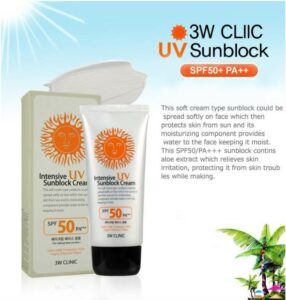
Best Features:
- One of the oldest sunscreen brands in Asia that have excellent sun protection.
- It is affordable and accessible so that you won’t have a problem restocking this.
- It can also be used as body sunblock
- Best for those with fairer skin
Eucerin Oil Control Sun Gel-Cream SPF50+
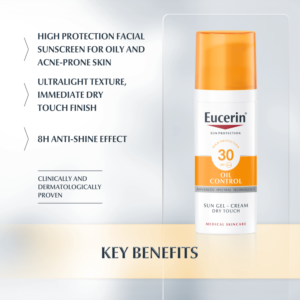
Best Features:
- Anti-shine effect, without the matte feel
- Very light, gel-type sunscreen that is perfect for humid weather
- Easy to apply
Clinelle UV Defense Ultra Protection Mist Spray
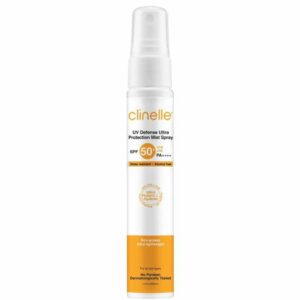
Best Features:
- Ultra fine mist for easier application
- Light to no scent
- Versatile sunscreen with UVA and UVB coverage
Allie Extra UV Gel
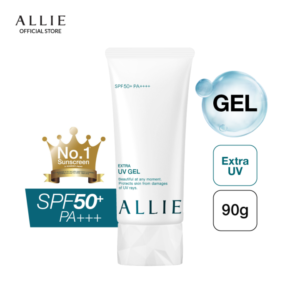
Best Features:
- Gel-type, non-sticky consistency
- Great for face and body
Birch Juice Moisturizing Sunscreen
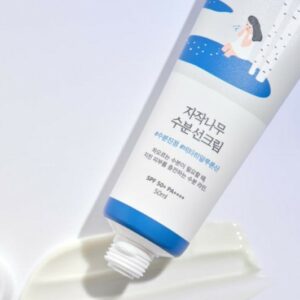
Best Features:
- It comes in a non-fluorinated formula and does not contain artificial fragrances
- Relatively affordable for a 100ml bottle, plus it lasts for six months–one tube should last you all year!
- No sticky feeling after application
- Protects against UV rays, as well as hydrates your skin
FAQs
Does sunscreen make your face greasy?
Some sunscreen also leaves the skin white. It remains manageable. Thanks to booming Beauty markets, many products have been created to provide a more affordable solution. The sunscreen is greasy for everyone; with time, a greasy texture can cause the face to appear shiny.
Why does my sunscreen make me look greasy?
But you can get worried if your face is oily from sun exposure. Some people with oily skin should not apply sunscreen as the skin feels too heavy and clogged.
Conclusion
Sunscreen is essential to a healthy skincare routine, but it’s not always easy to find one that doesn’t make your face oily. In this blog post, we’ve highlighted some tips on choosing a non-greasy sunscreen and listed our top picks for those with oily skin. We’ve also answered the question: does sunscreen make your face greasy? If you’re still worried about your skin’s reaction to sunscreen, consult with a dermatologist to figure out which ingredients are best for you.
Last Updated on
- Exhaust fan vs ceiling fan - September 24, 2022
- What is Air Purifier Necklace? - August 30, 2022
- Can You Use an Air Purifier and Fan at the Same Time? - August 28, 2022
